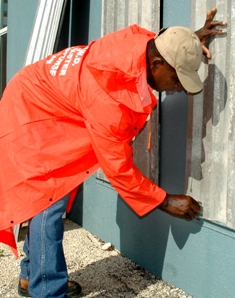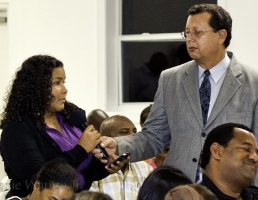Archive for November, 2010

Canadian airline touches down in Cayman
 (CNS): The first ever direct WestJet Airlines Jet flight from Toronto, touched down at Owen Roberts last week to a personal welcome from the country’s premier and other officials. Government has had a partnership with the airline in its sights for several years as a significant number of visitors to the Cayman Islands come from Canada. “We are absolutely delighted to welcome WestJet Airlines to the Cayman Islands and look forward to a fruitful and strategic relationship for a long time to come,” McKeeva Bush said at a reception held at the airport for WestJet executives, local dignitaries and the media.
(CNS): The first ever direct WestJet Airlines Jet flight from Toronto, touched down at Owen Roberts last week to a personal welcome from the country’s premier and other officials. Government has had a partnership with the airline in its sights for several years as a significant number of visitors to the Cayman Islands come from Canada. “We are absolutely delighted to welcome WestJet Airlines to the Cayman Islands and look forward to a fruitful and strategic relationship for a long time to come,” McKeeva Bush said at a reception held at the airport for WestJet executives, local dignitaries and the media.
“This flight marks an important beginning for our tourism plans for the Canadian market. The Department of Tourism’s strategic plan calls for greater outreach in Canada, which essentially means we needed an additional airline partner to help us grow our market share, particularly from Western Canada,” Bush added. “I am proud to say that in WestJet, we have found a partner that is reliable, safe, cost-effective and guest-oriented to enhance our marketing efforts.”
After a traditional ribbon-cutting ceremony the Cayman Islands government and WestJet exchanged gifts with Cayman presenting the airline with a model replica of a jet liner carved by a local artisan from Caymanite.
“To say we are excited about having WestJet Airlines flying to Grand Cayman is an understatement,” said Paul Minich, country manager for the Cayman Islands Department of Tourism in Canada. “WestJet has a solid reputation built on quality customer service and attractive fares. Not surprisingly, Canadians are already seeing fares to Grand Cayman becoming much more competitive heading into this winter season so we are anticipating a very healthy uptick in our visitor arrivals.”
Minich also noted that WestJet enables the destination to better market itself to Western Canadians, many of whom are brand loyal to the airline.
“A full quarter of our Canadian visitors come from Western Canada and this new relationship represents a real opportunity for us to grow that number even further,” said Minich.
WestJet’s regularly scheduled service to Grand Cayman from Toronto will see the carrier flying three times per week on Tuesdays, Thursdays and Sundays. The service compliments already existing direct and connecting flights via major gateways in the U.S.
WestJet offers scheduled service throughout its 71-city North American and Caribbean network. Inducted into Canada’s Most Admired Corporate Cultures Hall of Fame and named one of Canada’s best employers, WestJet pioneered low-cost flying in Canada. WestJet offers increased legroom, leather seats and live seatback television provided by Bell TV on its modern fleet of 90 Boeing Next-Generation 737 aircraft. With future confirmed deliveries for an additional 45 aircraft through 2017, WestJet strives to be one of the five most successful international airlines in the world.

5-day work permits coming, says CIO
(CNS): Senior Immigration Department staff finished a round of public meetings in the one district where the chief immigration officer does not have control of immigration. While CIO Linda Evans headed a panel held on Cayman Brac, District Commissioner Ernie Scott, who was also at the meeting, heads the department on the Sister Islands. Although she does not have oversight on the Brac, Evans laid out some of the improvements that are being made in customer service within the department, including five-day work permits given on entry, and greater use of technology to make the department more efficient.
Evans explained that the planned five-day work permits will be acquired at the airport on entry and will allow companies to access people outside the jurisdiction quickly. She said the person would arrive by invitation of a local company, would fill out a form at the airport and pay a fee for a 5-day non-renewable permit.
Another significant change to be implemented in boarder control is the requirement by immigration for airlines to supply an electronic manifest, which they will be able to use to scan a database for undesirables leaving and entering the jurisdiction, and could also screen for children in custody disputes.
A backlog of 1500 work permit applications has been reduced to 6,000, the CIO reported, while the turnaround for business staffing plans is now down to three or four weeks.
Explaining some of the improvements taking place in the Immigration Department to improve service and turnaround times, the CIO said they were embracing the use of technology. Starting with a pilot group this week they would approving licences by email, she said. The department is also working on improving online access so that employers can see the status of applications. If they are deferred they can see what was missing and if they are refused they can see why.
Staff will also be scanning active files – about 30,000 out of the total of some 126,000 files – so that they could be accessed electronically, starting in the coming weeks with work permit files, which would have the greatest impact. The department does not have the funding to complete the process but they were hoping to get enough in the next budget to finish, Evans said.
Figures for the Sister Islands, supplied by staff at the Brac office at the meeting since they are not apparently held by staff on Grand Cayman, revealed that between 1 January and 1 November 2010 the Immigration Board for Cayman Brac and Little Cayman processed 324 annual work permits, nine of which were refused. During this time period, the Sister Islands board also processed 281 temporary permits, eight of which were refused. Trade and Business licences are processed in Grand Cayman, and immigration received 144 applications from the Sister Islands, Brac staff said.
Senior Immigration Officer Roger Scott, who reports to District Commissioner Scott rather than CIO Evans, noted that status and permanent residency applications from the Brac are also processed in Grand Cayman and that the cultural tests also have to be done there.
Assistant Chief in the Enforcement and Intelligence Division, Jeremy Scott, said they rely on members of the community to inform them of breaches in immigration law. All anonymous reports are confidential and can be made on the new hotline (1-800-534 2546) or email address (legalim@gov.ky).
Scott said that between 1 July 2009 and 30 June 2010, the division made 108 arrests, of which 72% were male and 28% female, for a range of offenses, including illegal employment, altering documents, working without a permit, obstructing law enforcers and making false statements. Almost half (48%) were for overstaying, he said.
Fines incurred by culprits for the last fiscal year amounted to $181,000, compared to $73,161 the year before, an increase of 240%. In the first four months of this current fiscal year, they have already handed out $76,000 worth of fines, Scott said.

Social employment faces cut
 (CNS): The civil service review team has told the Public Works Department to end its policy of social employment. According to its first report, which recommended $17 million in cuts to public spending in four agencies, government should not use the Public Works Department as somewhere to employ people with low skills and should downsize to the correct staffing levels at the top and the bottom. The team recommended savings of CI$2.2 million, or 20 percent of current expenditure, by reducing the headcount of unskilled workers and what it described as top-heavy management. The review team found that what were referred to as “social employees” made up close to a quarter of the workforce.
(CNS): The civil service review team has told the Public Works Department to end its policy of social employment. According to its first report, which recommended $17 million in cuts to public spending in four agencies, government should not use the Public Works Department as somewhere to employ people with low skills and should downsize to the correct staffing levels at the top and the bottom. The team recommended savings of CI$2.2 million, or 20 percent of current expenditure, by reducing the headcount of unskilled workers and what it described as top-heavy management. The review team found that what were referred to as “social employees” made up close to a quarter of the workforce.
The report said employing individuals whose skills, abilities and mental/physical capacity rendered them less productive and prevented them from finding equivalent work in the private sector was a major contributing factor in the department’s failure to be competitive. The review recommended that such employees are reassessed and those capable of progressing identified and trained to do more productive work within PWD, other government agencies or even the private sector.
Government has a goal to ensure that employment is as close to 100% as possible. In the past PWD has been unofficially required to employ individuals with criminal convictions, poor skill sets and those who are otherwise not able to gain employment elsewhere. Although PWD is not currently hiring such individuals, significant numbers of existing employees remain and the hidden costs of social employment fail to register the true expense to the public of meeting the goal of 100% employment.
The review team recommended that it would be more productive tointroduce a ‘back to work’ programme with better tailored opportunities for training and experience.
“Continuing to mask this activity leads to passing the cost on to PWD’s clients … unfairly fostering the perception that public works is expensive,” the report stated, adding that it was unreasonable to require PWD to continue this unofficial programme and holding them accountable on cost comparisons with the private sector.
The team also warned that employing such individuals without properly recognising their needs can lead to other higher performing employees feeling demotivated and a sense of being treated inequitably, particularly when teamed up with the socially employed.
“As a last resort these staff could be made redundant in an effort to improve efficiency, competitiveness and reduce PWD’s operating costs,” the report stated. The management at PWD agreed that social employment had a number of problems associated with it as the staff take “excessive supervision and management time”, had a significant negative impact on efficiency, quality and cost of work, motivation of other staff and a negative effect on the perception of the department.
However, the review team admitted that policy of not employing “partially productive Caymanian workers” could have a knock-on effect elsewhere as redundancies would have financial, social and political implications, but the department would benefit from a reduced headcount, less overhead costs and a more competitive cost structure.
It was not just those at the bottom of the skill pile, however, that the review team said needed to be let go. The report revealed that the PWD was also top heavy, especially as inter-agency billing had been stopped and could save around a half million a year by reducing finance, administration and human resources staff.
“Some staff could be redeployed within other agencies. Some may have to be made redundant,” the report stated. Comparing the department to the prison service, which had a similar number of employees, the report said the prison had over 86% less HR, finance and administrative personnel than PWD.
“With the end of inter-agency charging for core government, reduced number of purchases with the re-introduction of stores and more streamlined processes, PWD can sustain a significant reduction in finance/admin and HR staff with little impact to service delivery,” it said.
However, management at PWD pointed out that while the two departments are of similar size, their businesses have little or no similarity. “PWD provides services to over 70 clients at over a hundred different sites around the island, including 7-10,000 maintenance work orders and 100+ capital projects a year,” it stated, observing that the prison also uses officers in administrative roles. It did, however, acknowledge there was room to reduce the head count.
As well as cutting staff, the report said the department needed to examine its effectiveness as efficiency at PWD was significantly hampered by “ineffective processes, lack of adequate materials and stores, poor procedures, poor utilization of transportation”, as well as problems with scheduling and monitoring of work.
“These shortcomings can be addressed through redesign and better management. Observed skill sets were in some areas questionable and retraining may be a necessary,” the review team said.
The team also recommended outsourcing of some services as well as creating competition with the private sector, allowing government departments to elect a private sector firm if it offered better value for money that the PWD. “While government must maintain a level of core skills in house, several areas within PWD, particularly in the works and MEP sections are viable to competition within two years,” the report said.
However, the management team warned that with social employment and the health and pensions costs, compared to those in the private sector the PWD could never compete on a level playing field. The PWD bosses also queried how they could prevent government departments getting “unfair” quotes from illegitimate contractors.
The ministry also warned that contestability would lead to the return of inter-agency charging, which was recently discontinued because it was inefficient. “PWD are still owed in excess of $6 million spread over 6 budget years due to non-payment of inter-agency charge,” the ministry observed.

Gov’t stops buying stuff
 (CNS): Details financial figures from the Treasury department have revealed that the government has managed to reduce its deficit with a combination of a $10.5million increase in some revenue generating measures, $5million less on extra ordinary expenses and a reduction of outputs and transfer payments to NGOs of over $6million. But its biggest overall cut was in the stuff it bought as government cut its supplies and consumables budget by almost $11.5million. According to the preliminary unaudited results for 2009/10 government spent over three quarters of a million more on personnel than anticipated in the revised budget but did far better in controlling spending on stuff.
(CNS): Details financial figures from the Treasury department have revealed that the government has managed to reduce its deficit with a combination of a $10.5million increase in some revenue generating measures, $5million less on extra ordinary expenses and a reduction of outputs and transfer payments to NGOs of over $6million. But its biggest overall cut was in the stuff it bought as government cut its supplies and consumables budget by almost $11.5million. According to the preliminary unaudited results for 2009/10 government spent over three quarters of a million more on personnel than anticipated in the revised budget but did far better in controlling spending on stuff.
The figures which reflect the government’s financial performance at the end of June were presented to the Legislative Assembly on Monday by the premier who said he was responding to requests for more information on how government had managed to reduce its anticipated revised deficit forecast of around $45million to an estimated $15milllion. Although the revenue increases from fees has boosted government coffers the largest part of the deficit reduction has come from spending cuts in services and goods and not personnel costs.
Facing his critics and the scepticism that has been raised about the latest set of financial figures, McKeeva Bush said the statistics demonstrated that his "pronouncements were supportable," although he pointed out that the financials have yet to be audited.
The news that the bulk of the deficit cut has come from a cut in the purchase of goods and consumables has still met with some concerns. The member from North Side, Ezzard Miller has said the $11.5million saved by simply not buying things is likely to be pushed into this budget year as government departments are forced to purchase the things they need to do their work that they did not buy in the last financial year.
The figures do reveal, however, some improvements in the anticipated revenue that government had expected to earn in the revised budget. Collection on duties was over half a million more than anticipated in the revised 2009/10 forecast though some $30million less that was first projected when Bush brought the original budget to the parliament in October 2009.
Despite a fall in work permit holders the government collected over $4million more than it had expected in the revised forecast earlier this year as a result of the increase in fees and the government’s single biggest improvement on anticipated revenue.
The figures also revealed that government is currently overdrawn by some $4million in its current account but has some $5million in its fixed deposit account. The public purse also has over $88 million in restricted funds.

Bids could become public
 (CNS): The premier has agreed to consider the possibility of allowing all bids for government contracts to be opened in a public forum after the close of deadline on tenders. A private members motion tabled in the Legislative Assembly on Monday asked for the central tendering process to be conducted in the open and McKeeva Bush said it would be given consideration. As the entire tendering process is under review, the premier said he would ask the auditor general to consider the idea raised by Ezzard Miller. The member for North Side said if all the bids were opened under the scrutiny of the public eye the people would be in a better position to determine if a final decision represented real value for the public purse or not.
(CNS): The premier has agreed to consider the possibility of allowing all bids for government contracts to be opened in a public forum after the close of deadline on tenders. A private members motion tabled in the Legislative Assembly on Monday asked for the central tendering process to be conducted in the open and McKeeva Bush said it would be given consideration. As the entire tendering process is under review, the premier said he would ask the auditor general to consider the idea raised by Ezzard Miller. The member for North Side said if all the bids were opened under the scrutiny of the public eye the people would be in a better position to determine if a final decision represented real value for the public purse or not.
The independent MLA said that although the details of the winning bid are revealed, the public cannot make a proper judgement on whether or not the company awarded the contract was the best choice when they do not see the other bids for that tender and are not privy to the process by which the technical team have arrived at their choice.
“It is time for government to open up the entire tendering process and have bids opened in front of all the bidders, the media and the public,” he said. Miller added that unless the details of all the bids were made public it would be difficult to determine if the technical teams involved had got the best value for money or why they had recommended a particular bid over another to the committee.
Acknowledging that government is not obligated to always select the lowest bid, Miller said that if those involved in the selection process know their decisions are taking place under much closer public scrutiny they would have to properly justify their decisions.
In response to the motion Bush said he would recommend that the idea of a more public process was considered during the full review of the central tendering process, though he said he did not think that it could always take place in public. The premier said it was hard to find people to serve in places where they had to make important decisions about people’s lives and sometimes they wanted “to do that in secret as this is a small place”.
The premier also said he did not think that decisions should be made before government had decided what it wanted to do, as he said the government must be the final arbitrator. However,he said government had no problem making changes to how public contracts are awarded and the issue of public tender meetings was something the auditor general should consider when he reviews the current tendering process, the premier added.

PPM criticises Mac over treatment of young leader
 (CNS): The opposition has taken the country’s premier to task for the way he addressed the leader of the youth branch of its party at a recent public meeting. Describing the apparent gender bias displayed by McKeeva Bush as unseemly, the PPM says he failed to answer the question she posed. The PPM said the country’s leader should not have berated Denise Miller, the president of the young progressives or others at the meeting who asked questions in the manner he did regardless of the party they support but should have answered the “pertinent questions.” (Photo Dennie Warren Jr)
(CNS): The opposition has taken the country’s premier to task for the way he addressed the leader of the youth branch of its party at a recent public meeting. Describing the apparent gender bias displayed by McKeeva Bush as unseemly, the PPM says he failed to answer the question she posed. The PPM said the country’s leader should not have berated Denise Miller, the president of the young progressives or others at the meeting who asked questions in the manner he did regardless of the party they support but should have answered the “pertinent questions.” (Photo Dennie Warren Jr)
In a statement issued on Tuesday morning, the opposition party states, “The PPM notes the unfortunate manner in which certain members of the public, including the President of the Young Progressives, Denise Miller, were addressed by the Premier at the Town Hall Meeting in Bodden Town, on the night of 2 November.”
On the night in question the premier was dismissive of both Miller and former radio talk show host Carolina Ferriera and referred to them as “darling” and “sweetheart” and noted that the young women were "just PPM” during the open mike session of the meeting.
The PPM pointed out that meeting was held in public, broadcast on radio and television as well as reported on news internet sites, giving the premier’s behaviour a wide audience.
“The PPM believes that no matter what view the Premier holds in relation to Miss Miller, the PPM, or any of its supporters, it was very unseemly for him to berate and display apparent gender bias towards Miss Miller and other members of the public in the manner that he did that night,” the opposition party stated. It said that they had asked pertinent questions which the premier failed to answer.
“The political leader and other parliamentary members of the PPM hereby stand behind Miss Miller in her pursuit of truth, and call upon the premier to observe and practice standards of decorum which are befitting of his high office. To do otherwise does not only a disservice to the Office of the Premier, but also inflicts damage to principles of Open Government and Transparency. The premier should be encouraging young people such as Miss Miller to continue to participate and be involved in national issues. We commend Miss Miller for standing her ground under immense aggression and incivility from the Premier.”
A recent Viewpoint published on CNS by a member of the founding committee of the Crisis Centre and the chair of the Special Advisory Committee on Gender Violence also noted the inappropriate behaviour of the premier. Len Layman said that Bush’s comments were delivered in a “disrespectful, offensive, condescending, gratuitous, and unbecoming” manner, not just of a premier but of anyone.

Bird strike damages CAL aircraft
 (CNS): A bird strike to Cayman Airways flight KX201 bound for Grand Cayman from Tampa minutes after the plane took off from the airport caused the aircraft to be grounded yesterday. After the bird hit the plane the crew immediately requested emergency clearance to return to Tampa’s runway, and landed safely without incident about 10 minutes after departure on Monday, 8 November at 3:25pm. Maintenance inspections on the ground in Tampa after landing, indicated minor damage to the aircraft, resulting in the aircraft being removed from service for repairs and the cancellation of flight KX201.
(CNS): A bird strike to Cayman Airways flight KX201 bound for Grand Cayman from Tampa minutes after the plane took off from the airport caused the aircraft to be grounded yesterday. After the bird hit the plane the crew immediately requested emergency clearance to return to Tampa’s runway, and landed safely without incident about 10 minutes after departure on Monday, 8 November at 3:25pm. Maintenance inspections on the ground in Tampa after landing, indicated minor damage to the aircraft, resulting in the aircraft being removed from service for repairs and the cancellation of flight KX201.
Cayman Airways Acting Vice President of Flight Operations, Captain Adrian “Rex” Miller commended the crew’s response. “The swift and professional response of Cayman Airways Captain Perry Panton, assisted by CaptainLeon Missick, is testament to their training and competence, which ensured our passengers’ safety and comfort throughout the event,” he said.
The airline said it had accommodated all passengers affected by the cancellation of flight KX201 by rerouting them through Miami where they connected with Cayman Airways flights to Grand Cayman.
Acting CEO Fabian Whorms said, “The safety and security of our passengers is our ultimate priority and we would like to thank all passengers involved for their patience and support. Additionally, we sincerely apologise for any inconveniences that the delayed arrival into Grand Cayman may have caused our passengers.”

Cops close case on bones found in George Town
(CNS): The human skeletal remains found in a wooded area off Bobby Thompson Way earlier this year have been identified as a man who disappeared some seven years ago. Police confirmed on Tuesday that the investigation launched following the discovery of the bones, which had been in the place where they were found for several years, has now been completed and the case has been closed. The police said there were no suspicious circumstances surrounding the death of the 38-year-old man. Following extensive forensic testing, police are now certain who the man was but at the request of his family did not reveal his name.
Detective Superintendent Marlon Bodden, the officer who led the investigation, confirmed that the file was closed and the family of the deceased had been informed. “We have established that the deceased was a male, now known to authorities,” Bodden said. “The deceased was reported missing in June of 2003, when he was aged 38 years. Despite extensive enquiries carried out at the time by the police and his family, the deceased was never traced. Over the past 7 years his family have been left wondering what had become of him.”
Bodden said that in respect to the family he would not comment on his death but there were no suspicious circumstances.
According to reports in the Caymanian Compass, the body is allegedly that of Keith Augustus Balkaran, of Jamaica, who wasbelieved to have gone missing around 8pm Saturday, 31 May 2003. His disappearance was later reported to police and he said to have was last been seen earlier that evening at an address on Fairview Road, George Town.
MLA appears in dock
(CNS): The backbench UDP representative for Bodden Town made his first courtroom appearance this morning over charges relating to an assault at the Grand Cayman Beach Suites in May. Standing in the dock with his co-defendant, Joseph Minzett, Dwayne Seymour faced Magistrate Margaret Ramsey Hale as his defence counsel, Steve Mcfield, asked for a continuance, saying he had just received the evidence against his client from the crown. Both men were bailedto return to court on 30 November. Seymour is facing charges of common asault and attempting to pervert the course of public justice. The elected official has denied the charges and recently claimed he was suprised to have been charged so long after the incident.
Seymour and Minzett have been charged in connection with an incident which occurred at the Grand Cayman Beach Suites on Saturday, 1 May. At the time of the incident, Florida based personal trainer Garrone Yap claimed he was assaulted by Seymour and another man outside the hotel. All three men were arrested, but Yap was released without charge.

New Firefox add-on protects you against hackers
 (CNN): If you’re concerned about using open Wi-Fi networks because of Firesheep, the highly popular new hacking tool, you should check out BlackSheep, a Firefox add-on that makes surfing on open networks safe once again. Firesheep came onto the scene not too long ago. It’s a bit of code that allows just about anyone to access your web accounts via session hijacking. Basically, anyone browsing on a non-password-protected Internet connection, such as a Starbucks network or even an airplane, has been at risk for having their accounts accessed by a total stranger. One way around this issue is using a VPN every time you log on via an open network. But let’s face it: For the average Internet user, this kind of work-around is a hassle, and most people care more about convenience than security.
(CNN): If you’re concerned about using open Wi-Fi networks because of Firesheep, the highly popular new hacking tool, you should check out BlackSheep, a Firefox add-on that makes surfing on open networks safe once again. Firesheep came onto the scene not too long ago. It’s a bit of code that allows just about anyone to access your web accounts via session hijacking. Basically, anyone browsing on a non-password-protected Internet connection, such as a Starbucks network or even an airplane, has been at risk for having their accounts accessed by a total stranger. One way around this issue is using a VPN every time you log on via an open network. But let’s face it: For the average Internet user, this kind of work-around is a hassle, and most people care more about convenience than security.